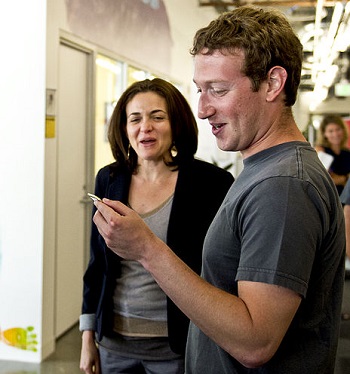The creator of the social network is working hard to fight growing accusations of its role in the election results.
Amidst a rapidly rising body of criticism against Facebook social media marketing, Mark Zuckerberg insists the network isn’t to blame for Donald Trump’s victory. Critics claim that viral fake pro-Trump news stories on Facebook led to the Republican’s election win.
Zuckerberg has responded quite forcefully, saying that he feels the accusation is a “pretty crazy idea.”
Speaking onstage at a recent conference, Zuckerberg addressed the thought that Facebook social media marketing contributed to Donald Trump’s election. “Personally,” he said, “I think the idea that fake news on Facebook, which is a very small amount of the content, influenced the election in any way—I think is a pretty crazy idea. Voters make decisions based on their lived experience.”
Zuckerberg also went on to ask “Why would you think there would be fake news on one side and not the other?”
That has not assuaged the critics insisting Facebook social media marketing doesn’t properly filter fake news.
 Many claim that as the largest social media platform worldwide, viral hoax news posts shared there may have helped Trump to win. The reason, say many, is that Facebook either refuses or is not able to contain the spread of those fake news articles.
Many claim that as the largest social media platform worldwide, viral hoax news posts shared there may have helped Trump to win. The reason, say many, is that Facebook either refuses or is not able to contain the spread of those fake news articles.
Moreover, BuzzFeed News conducted an investigation earlier in 2016 which examined the most right-wing extremely partisan publications published by Facebook pages. They determined that 38 percent of the news shared by those sources was misinformation. That said, when examining the same type of page on the left-wing side, misinformation occurred considerably less: 20 percent of the time.
Those figures may not sound too problematic, but BuzzFeed News also identified another trend with this form of Facebook social media marketing. The stories with the lowest accuracy were the ones BuzzFeed found to generate the largest number of shares and reactions (such as Likes). Inaccurate stories on Facebook pages greatly outperformed publications shared on Facebook pages from more mainstream political news sites. Over the last few months, a rash of hoax news sites were created in order to take advantage of this trend.
The popular mobile messaging app will now be giving the social network its user data for ad targeting.
WhatsApp privacy is the catch users have been waiting to find. Mobile app users have wondered why WhatsApp suddenly changed from a premium application to a free one. The cost may not be in currency but will instead be in shared user data.
Facebook owns WhatsApp but has, until now, kept its fingers out of the user data files from the application.
Now, Facebook will be changing the level of WhatsApp privacy available to users. The mobile will share user data with Facebook for ad targeting purposes. Initially, it appeared that while there are certain controls being added to the mobile app’s settings, it isn’t possible to opt out entirely.
However, once a user has accepted the new terms and conditions for use of the app – a requirement for being able to use it – the mobile application automatically adds a new option within the settings for the account. There, users can choose to opt out of the information sharing – a permanent choice that cannot be changed after it has been made. That said, unless the users opt out, the mobile application will start sending some of the data in the account with the parent company.
This massive change was announced in a large update to the WhatsApp privacy policy.
 A recent WhatsApp blog post said “[B]y coordinating more with Facebook, we’ll be able to do things like track basic metrics about how often people use our services and better fight spam on WhatsApp.” Facebook will be better capable of showing more relevant advertising and improved friend suggestions, said the blog post.
A recent WhatsApp blog post said “[B]y coordinating more with Facebook, we’ll be able to do things like track basic metrics about how often people use our services and better fight spam on WhatsApp.” Facebook will be better capable of showing more relevant advertising and improved friend suggestions, said the blog post.
Beyond Facebook itself, WhatsApp will also be sharing user data with the entire “Facebook family of companies.” This may include other Facebook acquisitions and firms, such as Oculus Rift, a virtual reality firm. That said, Facebook also owns Instagram, the photo sharing network, which may mean information will be shared there, too.
Among the user information to be shared under the new WhatsApp privacy policy is even the phone number used for account verification. This has already caused many users to bristle, with displeased comments appearing over Facebook and Twitter. There are certain pieces of information that consumers are more and less comfortable sharing openly. A telephone number does not typically fall within the category of the data they are pleased to see shared with unknown recipients.
 Many claim that as the largest social media platform worldwide, viral hoax news posts shared there may have helped Trump to win. The reason, say many, is that Facebook either refuses or is not able to contain the spread of those fake news articles.
Many claim that as the largest social media platform worldwide, viral hoax news posts shared there may have helped Trump to win. The reason, say many, is that Facebook either refuses or is not able to contain the spread of those fake news articles.
 A recent WhatsApp blog post said “[B]y coordinating more with Facebook, we’ll be able to do things like track basic metrics about how often people use our services and better fight spam on WhatsApp.” Facebook will be better capable of showing more relevant advertising and improved friend suggestions, said the blog post.
A recent WhatsApp blog post said “[B]y coordinating more with Facebook, we’ll be able to do things like track basic metrics about how often people use our services and better fight spam on WhatsApp.” Facebook will be better capable of showing more relevant advertising and improved friend suggestions, said the blog post.